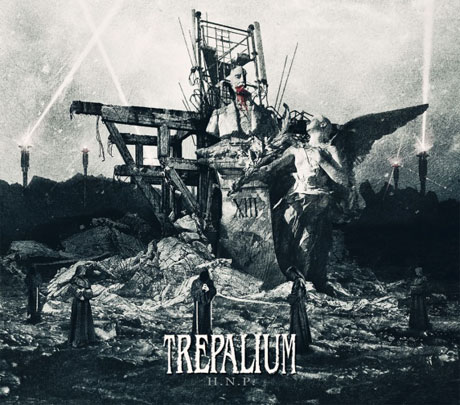It didn’t take any sort of deep thought for me to tell just how angry the band’s vocalist, Phil Bozeman, is on these songs. Based off of his grunts, pessimistic lyrics, and overall tone throughout the album’s 9 vocally-driven tracks, the man is pretty livid. Some of the songs have a sort of predictable range of topics for a deathcore band, stretching from subjects like fear, death, corruption, and insanity among a few other things. Even with all of that, this album still has more to prove and exhibit then some of the other bands within the scene.
The instrumentation is really what makes this album stick out above the rest of Whitechapel’s discography. An acoustic guitar is used somewhere in the middle of “Make it Bleed”, the album’s opening track, and in my opinion, I think it makes for a great effort with helping spice things up and keep things interesting without seeming to be forced. There some are a few piano intros and outros that lie somewhere on the border between cliché and natural.
There’s a very subtle use of electronics sprinkled throughout the release, one of the best examples of this would be an early part of the song “I, Dementia”. Don’t let that scare you into thinking that there are any dance-y beats present, electronics in the world of Whitechapel translate into minimalistic lo-fi synth and drum beats more than anything else. I’m very glad to know that there are not any sort of dubstep wobbles of any kind in any of these songs. This goes to show that Whitechapel makes a defiant stand of not running with most of the trends that are present in both the mainstream and underground world.
Yes, I said “most of the trends”. You’ll still find blast beats, breakdowns, and an occasional guitar solo in here. I mean, if you’re able to get past the fact that those things make up the very foundation of deathcore, you’ll still be set to be surprised with everything in the album. One of my favorite things about Whitechapel is the band’s usage of not one or two, but three guitarists that devastatingly cut through the mix while they shred, chug, and harmonize their way into your eardrums. At times, I could say that the songs have a definite doom metal groove to them, while at other times, I could say that they have a few quick bursts in tempo – something that could oftentimes be found in some of the many genres of metal.
This album wasn’t a hard listen by any means. The songs hold their own both collectively and individually. I didn’t feel like I was sitting through a nearly 40 minute long wall of sound, I felt like I was actually listening to a an actual album. This music makes me think about many things, it makes me think about a lot of the crazy, self destructive things that people do to themselves, it makes me think about the punishing things that people do to one another. Most of all, it makes me think about human nature in general.






